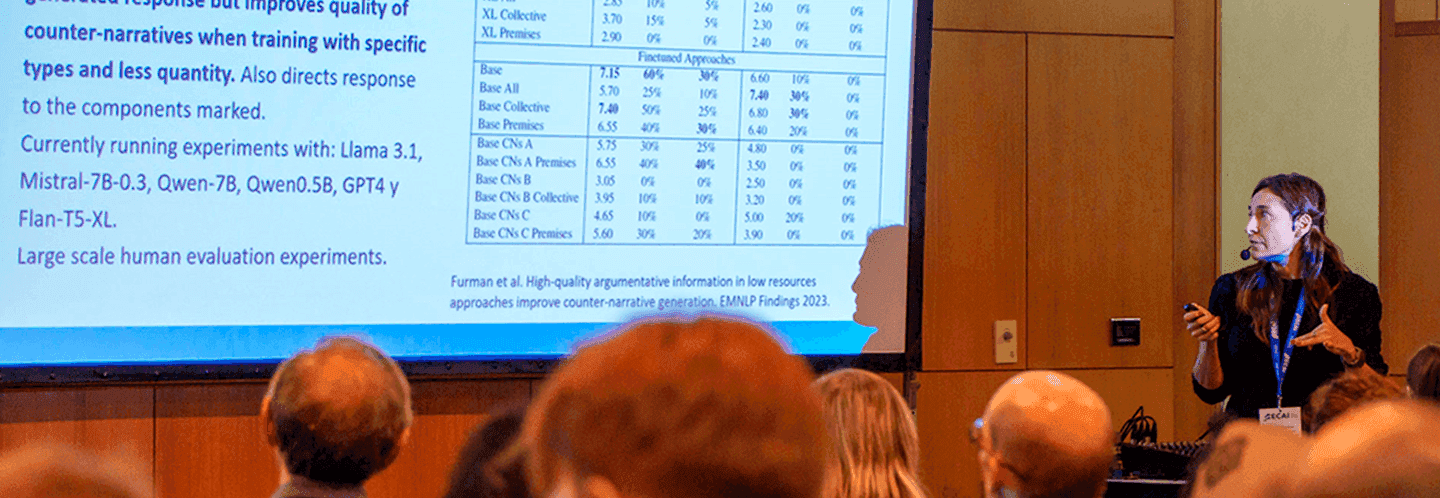
Argumentation, supported by AI, is revealed as the most effective tool for combating hate on social media, rather than censorship or "blocking"
Argumentation, supported by Artificial Intelligence, has been confirmed as the best tool for combating hate crime on social media, as opposed to censorship or blocking, because it helps spread a message against hate that will reach people who are not necessarily convinced.
"Censorship" and "blocking" users have proven to be "ineffective" tools for combating hate crimes on social media, so it is more advisable to focus on "argumentation and counter-narratives," explained María Vanina Martínez, senior researcher at the Institute of Research in Artificial Intelligence (IIIA) of the Spanish National Research Council (CSIC).
In the presentation of her work Back to the Future: Symbolic Reasoning to Combat the Misuse of Social Media at the European Conference on Artificial Intelligence (ECAI 2024), held from October 19 to 24 in Santiago de Compostela, María Vanina Martínez asserted that "argumentation is better than censorship because it helps spread a message against hate that will reach people who are not necessarily convinced or even involved in the conversation".
The researcher from the Institute of Artificial Intelligence of Catalonia (IIAC) pointed out that social media is one of the "main ways to connect and communicate" today, and its content, "whether generated automatically or not, influences our beliefs and the decisions we make." "They are useful tools, but they also expose us to threats such as misinformation, abusive or toxic content, hate messages, manipulation... and this is dangerous considering that social media and AI replicate and multiply their effects," she added.
She also warned that current results in identifying malicious use of social media "are not good," because the companies owning the major social networks tend to outsource this type of service, and "combating malicious use on social media involves solving complex and subjective tasks that require synergies between automated AI tools and humans."
For this reason, she advocated for "using AI effectively to combat misinformation and hate messages on social media," combining machine learning methods and language-based models. "Knowledge-based models, particularly those based on logic and reasoning, are useful for identifying and combating malicious use of social media, for example in analyzing and identifying hate messages and generating counter-narratives to combat them," she added.
According to her explanation, hate messages on social media are addressed through "content removal and user blocking," which helps prevent further spread, although "it has no real impact if these messages have already been internalized by a part of the population." "Moreover, these practices violate freedom of speech," she emphasized.
María Vanina Martínez argued that there are "systematic patterns of argumentation in hate messages" and that "automatically identifying them with AI will help combat them." Thus, "automatic argument analysis provides more alternatives to censorship, such as recovering the argumentation and generating automatic counterarguments."
She stated that in the future, AI will allow "the generation and training of counter-narratives for specific communities" to combat hate crimes or hoaxes, such as historical denialism or ongoing conflicts like the war in Ukraine or the Israel-Palestine conflict. As an example, she mentioned the work being done in Argentina with football fans and social organizations in a highly polarized country, amidst an overall crisis environment.
Helping Developing Countries
On the other hand, researcher Yirui Jiang argued that it is necessary to "leverage AI to promote high-level development in emerging markets," as it will allow these countries to "bypass certain stages of development that other more advanced countries have already gone through." As she explained in her presentation during the Birds of a Feather (BoF) session, AI helps these countries propose "new concepts and process large amounts of data," create more job opportunities, and improve labor efficiency, which will drive their economies forward. In Jiang's view, from a social perspective, AI can "be integrated into the healthcare industry, the retail industry, reduce carbon emissions, and address climate change issues".
ECAI 2024
The European Conference on Artificial Intelligence (ECAI 2024), held from October 19 to 24 in Santiago de Compostela, brings together over 1,600 participants representing the global elite in Artificial Intelligence research. The event, supported by the European Association for Artificial Intelligence (EurAI), the Spanish Association for Artificial Intelligence (AEPIA), and organized by CiTIUS (Singular Research Center in Intelligent Technologies at the University of Santiago de Compostela - USC co-funded by the European Union through the Galicia ERDF 2021–2027 programme) features an extensive program including presentations of the latest scientific findings, lectures, debate panels, workshops, and demonstrations to highlight AI’s contribution to societal development.
ECAI 2024, under the motto "Celebrating the Past. Inspiring the Future", marks the 50th anniversary of the first European AI conference held in Brighton in 1974. This is the second time the European Conference on Artificial Intelligence has been held in Santiago de Compostela, after the 2020 event, which, during the COVID-19 pandemic, had to be switched to an online format, making it a pioneering fully digital event worldwide.
This edition sets a new record, both in the number of presentations, which exceed 500, and in the number of attendees and the relevance of its content. Without a doubt, this has made Santiago de Compostela the global capital of artificial intelligence for the week of October 19-24.